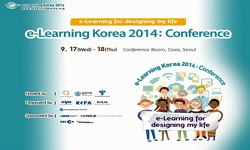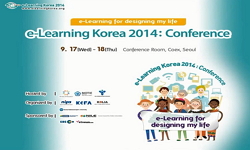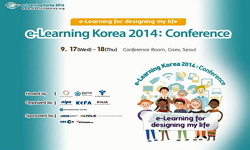Web 2.0 technologies have changed the learning process and have affected the unidirectional relationship obtaining between the teacher and the student. Web 2.0 has given rise to new bidirectional learning strategies in which the learner is both an act...
http://chineseinput.net/에서 pinyin(병음)방식으로 중국어를 변환할 수 있습니다.
변환된 중국어를 복사하여 사용하시면 됩니다.
- 中文 을 입력하시려면 zhongwen을 입력하시고 space를누르시면됩니다.
- 北京 을 입력하시려면 beijing을 입력하시고 space를 누르시면 됩니다.
https://www.riss.kr/link?id=A101831188
- 저자
- 발행기관
- 학술지명
- 권호사항
-
발행연도
2016
-
작성언어
English
- 주제어
-
자료형태
학술저널
-
수록면
191-200(10쪽)
- 제공처
-
중단사유
※ eArticle의 서비스 중단으로 원문이 제공되지 않습니다.
-
0
상세조회 -
0
다운로드
부가정보
다국어 초록 (Multilingual Abstract)
Web 2.0 technologies have changed the learning process and have affected the unidirectional relationship obtaining between the teacher and the student. Web 2.0 has given rise to new bidirectional learning strategies in which the learner is both an actor and active member in the learning process. Given the wide use of these technologies as educational tools, our objective in this article is to analyze learners’ comments in discussion forums, which are popular platforms amongst students. For this purpose, we use the Latent Semantic Analysis (LSA), a statistical model that can allow us to establish the relationship between the set of messages published by learners and course content that students need to master. We also use sentiment analysis techniques to identify the students’ opinions about educational issues that are problematic. The implementation of both methods has revealed that the data available in educational discussion boards can improve the quality of learning and teaching.
목차 (Table of Contents)
- Abstract
- 1. Introduction
- 2. Discussion Forums and e-Learning
- 3. Towards a Discussion Forum that Supports Learning
- 3.1. Preprocessing
- Abstract
- 1. Introduction
- 2. Discussion Forums and e-Learning
- 3. Towards a Discussion Forum that Supports Learning
- 3.1. Preprocessing
- 3.2. Keywords Extraction
- 3.3. Representation
- 3.4. Textual Similarity
- 3.5. Sentiment Analysis
- 3.6. Algorithm
- 3.7. Evaluation
- 4. Simulation and Results
- 4.1. Corpus Description
- 4.2. Results and Discussion
- 5. Conclusion
- References
동일학술지(권/호) 다른 논문
-
- 보안공학연구지원센터(IJSEIA)
- Mi-Jin Kim
- 2016
-
- 보안공학연구지원센터(IJSEIA)
- Jashojit Mukherjee
- 2016
-
The Butterfly Algorithm: A Contradiction Solving Algorithm based on Propositional Logic for TRIZ
- 보안공학연구지원센터(IJSEIA)
- Jung Suk Hyun
- 2016
-
Towards Conceptual Predictive Modeling for Big Data Framework
- 보안공학연구지원센터(IJSEIA)
- Jeong-Sig Kim
- 2016
분석정보
연관 공개강의(KOCW)
-

e-learning 영어강좌
동아대학교 손석주 -

2014 이러닝 국제 콘퍼런스 : Understand Seniors’ Motivation in e-Learning through
한국교육정보진흥협회 Thomas Kuan -

2014 이러닝 국제 콘퍼런스 : Developing the PETAL e-Learning Platform~
한국교육정보진흥협회 Vincent Tam -

2014 이러닝 국제 콘퍼런스: Analysis of e-Learning Program Management for Adults in Korea
한국교육정보진흥협회 Don-Min, Choi -

데이터 마이닝(텍스트 마이닝)
충북대학교 성현곤





 eArticle
eArticle

